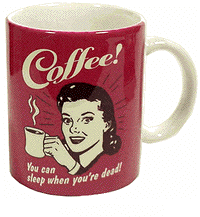 - CAFFEINE is one of
the most popular drugs in the world today, but
its habitual use is not without side effects.
One of them is the clear pattern of
physiological withdrawal symptoms that appears
when habitual consumers abruptly stop their
intake.
-
- The best known symptom
following, sudden caffeine abstinence is
headach. Studies in the late 1960s reported that
abnormal sleepiness and irritability were also
common symptoms. Withdrawal symptoms are not
associated only with high levels of chronic
caffeine intake. It was noted that withdrawal
symptoms of headache, fatigue, sleepiness and
decreased vigor, alertness and activity can
occur even in people who normally consume as
little as 100 mg, of caffeine per day.
-
- More severe symptoms have
been reported as well. For example, a study of
light to moderale coffee drinkers reported
increased scores for clinical symptoms of
depression and anxiety and the presence of
flu-like symptoms, in many individuals, after 2
days od caffeine abstinence.These symptoms of
caffeine withdrawal can clearly be clinically
signifian, and the may be quite common given the
widespread consumption of the drug.
-
- The studies, conducted by
these authors investigated mood, symptoms and
psychomotor performance in coffee drinkers who
had drunk coffee ad libitum or been abstinent
during the morning prior to testing at midday,
an experimental design intended to simulate
these natural episodes of brief deprivation.
-
- After only a few hours of
caffeine deprivation, participants reported
decreased energy, desire to socialize and
ability to concentrate as well as increased
drowsiness, lethargy and yawning. In
contrast, the authors detected no decrements in
performance of a variety of computerized
psychomotor tasks.
-
-
- Le café est une
des boissons les plus largement usitées
dans le monde actuellement. Sa consommation
régulière n'est pas sans engendrer
des effets secondaires. Parmi eux, le syndrome
de sevrage, apparaissant lors d'un arrêt
brutal, associe des symptômes, tels
céphalées, somnolence,
irascibilité.
-
- Ce syndrome de sevrage
n'est pas toujours corrélé
à une consommation importante de
caféine puisque qu'il peut survenir
dès une absorption quotidienne de 100mg.
D'autres troubles plus sévères ont
aussi été rapportés comme
des dépressions, de
l'anxiété, un syndrome grippal,
après deux jours d'abstinence. Ces
symptômes peuvent donc être
cliniquement pertinents et rencontrés
fréquemment compte-tenu du large usage du
café et du thé.
-
- Les études,
présentées ici, ont exploré
l'humeur, les symptomes de sevrage et les
performances psychomotrices de consommateurs
réguliers de café, suivant
librement leurs habitudes, après une
brève abstinence d'une matinée.
-
- Après seulement
quelques heures de manque, les participants ont
déclaré ressentir une baisse
d'énergie, des difficultés
à maintenir une sociabilité
adéquate et une concentration
intellectuelle optimum. D'autres part, ils ont
noté une augmentation de leur sensation
de fatigue, une somnolence et de
nombreux bâillements.
Par contre, les auteurs n'ont pas pu
caractériser de baisse d'efficience au
cours de tests psychomoteurs
informatisés.
-
- Caffeine
withdrawal: a parametric analysis of caffeine
dosing conditions
- Evans SM, Griffiths RR J Pharmacol Exp Ther
1999;289(1):285-294.
-
- Caffeine
deprivation affects vigilance performance and
mood.
- Lane JD, Phillips-Bute BG Physiol Behav
1998;65(1):171-175
-
- Caffeine
withdrawal symptoms following brief caffeine
deprivation
- Phillips-Bute BG, Lane JD Physiol Behav
1997;63(1):35-39
-
- Effects
of brief caffeinated-beverage deprivation on
mood, symptoms, and psychomotor
performance.
- Lane JD Pharmacol Biochem Behav.
1997;58(1):203-208
-
|


